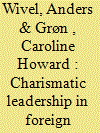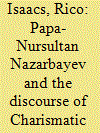| Srl | Item |
| 1 |
ID:
180830


|
|
|
|
|
| Summary/Abstract |
Charismatic leadership is an integral yet understudied aspect of foreign policy in liberal democratic states. Combining insights from recent developments on charismatic leadership in organization and management studies with literature on foreign policy, we construct a novel theoretical framework for understanding how foreign policy leaders exercise charismatic leadership. We argue that charismatic leadership makes sense of who ‘we’ are and where we are going through communicative practices. We specify these practices and discuss why charismatic leadership is important in foreign policy analysis; what it is; and how and why sense-making matters for a charismatic leadership style. We contribute with new empirical knowledge by probing our theoretical propositions in a comparative case-study of the charismatic leadership practices of Donald Trump and Angela Merkel. The case-studies illustrate the importance of charismatic communication for both leaders, while disclosing variations in both the ‘thickness’ of charismatic leadership practices and their compatibility with rational legal authority and liberal democratic values.
|
|
|
|
|
|
|
|
|
|
|
|
|
|
|
|
| 2 |
ID:
104197


|
|
|
|
|
| Publication |
2010.
|
| Summary/Abstract |
Taking a critical perspective on the Weberian concept of charisma this article examines elite and citizen discourse regarding the perceived charismatic leadership and nation-building achievements of the post-Soviet president of Kazakhstan, Nursultan Nazarbayev. Using a number of ideal type features of charismatic leadership based on the typology developed by Roger Eatwell, the article argues that Nazarbayev's leadership does not fit neatly the concept of charisma. Rather, in this instance, Nazarbayev's perceived charismatic leadership as the father of the Kazakhstani nation, and the single politician capable of meeting the challenges of post-Soviet nation-building, is a constructed discursive force projected from above at the elite level, which resonates with public attitudes towards him at the societal level. Charisma represents a discursive mechanism that emphasises President Nazarbayev's centrality to the unity, prosperity, and stability of the nation. This charismatic discourse has aided Nazarbayev in consolidating his authoritarian regime and illustrates the existence of a distinct form of post-Soviet charisma.
|
|
|
|
|
|
|
|
|
|
|
|
|
|
|
|
| 3 |
ID:
178380


|
|
|
|
|
| Summary/Abstract |
The Kurdistan Region of Iraq has a multi-party system which has been held up as a model for democratic pluralism in the whole region. The nature of Kurdistan’s political parties is strongly related to the position of Kurds in Iraq. From the mid-twentieth century, the dominant Kurdish political party in Iraq was the Kurdistan Democratic Party; in a later partisan split the Patriotic Union of Kurdistan was born. Moreover, in the last three decades other political parties have come into being, which have all influenced the characteristics of Iraqi Kurdistan’s political system. This paper’s main argument is that Iraqi Kurdistan shares many of the characteristics of its main political parties, including reliance on charismatic leadership, a focus on nationalism, and the lack of transparency. This paper analyzes the primary characteristics of the Kurdish political parties and their influence on the institutional functions of the political system in the Kurdistan Region.
|
|
|
|
|
|
|
|
|
|
|
|
|
|
|
|
| 4 |
ID:
115350


|
|
|
|
|
| Publication |
2012.
|
| Summary/Abstract |
Flemish nationalism is back on the scene. The Nieuw-Vlaamse Alliantie (N-VA), the political voice of democratic Flemish nationalism, emerged as the big winner of Belgium's 7 June 2009 regional elections. To a significant extent, the N-VA owes its success to the charismatic leadership of its chairman, Bart De Wever. This article investigates the nature of De Wever's charismatic authority, as well as its tenability. As the N-VA becomes a more prominent participant in the Flemish government, will the effect of De Wever's charisma wane? If the success of the N-VA is not structural but tied to the charisma of its chairman, will the party lose its prominence if De Wever fades?
|
|
|
|
|
|
|
|
|
|
|
|
|
|
|
|